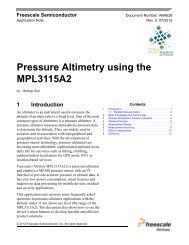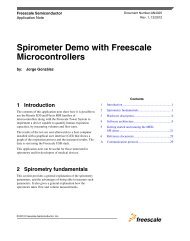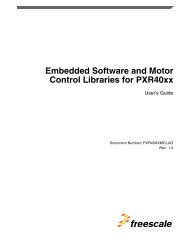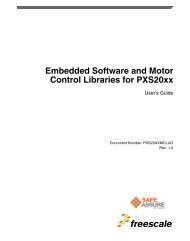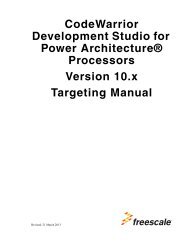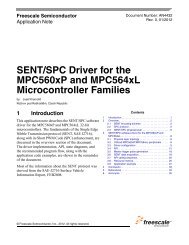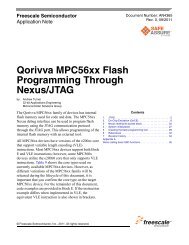Freescale MQX™ RTOS 3.6.2 Release Notes
Freescale MQX™ RTOS 3.6.2 Release Notes
Freescale MQX™ RTOS 3.6.2 Release Notes
Create successful ePaper yourself
Turn your PDF publications into a flip-book with our unique Google optimized e-Paper software.
6 Known Issues and Limitations<br />
6.1 Performance of Code Running in MRAM<br />
As described in the “MQX Getting Started” document, the “Ext. MRAM Debug” build-target provides<br />
the most convenient way how to download and run code on the MRAM equipped evaluation boards.<br />
One limitation of this solution is that the code runtime performance is approximately 8x degraded<br />
comparing to Flash-based execution. MRAM is an external memory device connected to the<br />
ColdFire core by 8-bit data bus and having one wait-state generated for each access. In order to<br />
fetch one 32-bit value (instruction) from the MRAM memory, four accesses need to occur – each<br />
inserting one wait-state clock.<br />
This behavior is normal by design and applies to other processors using the external memory to<br />
store executable code.<br />
6.2 Network Communication Performance and Delayed ACKs<br />
Significant differences in performance of host to target TCP communication can be observed,<br />
depending on which client operating system is used. These differences are a result of the<br />
difference in implementation of the TCP delayed ACK algorithm.<br />
Linux is more aggressive in acknowledging packets, and temporarily disables the delayed ACK<br />
algorithm on connection startup. As a result, there is no performance issue observed with Linuxbased<br />
browsers (Mozilla Firefox tested).<br />
Microsoft Windows based operating systems take a common approach to implementing the delayed<br />
ACK algorithm. As a result, web server performance can be significantly worse when it is accessed<br />
from Microsoft Windows-based browsers (Internet Explorer and Mozilla Firefox tested). This issue<br />
and a workaround are described at http://support.microsoft.com/kb/328890.<br />
This issue is not directly related to the RTCS stack, however limited RAM resources (e.g. 64KB on<br />
MCF52259) imply lower buffer and data window sizes, making it more difficult to work around the<br />
issue in RTCS software.<br />
6.3 Default Kernel Configuration of Small-RAM Devices<br />
The default kernel configuration of small-RAM devices is optimized in order to run the demonstration<br />
applications located in the /demo folder. To meet tight RAM constraints, some of MQX or RTCS<br />
features are disabled by default. Also some of the I/O drivers not used by the main demo<br />
applications are disabled.<br />
You typically get a compile-time error message if you try to run an example application while the<br />
required kernel feature or I/O driver is missing in the library code. In order to execute some of the<br />
example applications, you first need to enable the required features in the /config//<br />
user_config.h file and recompile all MQX libraries.<br />
6.4 USB Host HUB Examples<br />
HUB class support is enabled in HID example applications. The applications run correctly with the<br />
USB device attached both directly, or through the hub. However, the example code is still ready to<br />
handle a single device only. Combined Mouse+Keyboard demo is able to handle one mouse and<br />
one keyboard simultaneously. Using multiple devices of the same kind attached through the hub is<br />
not supported by the example applications.<br />
<strong>Freescale</strong> MQX <strong>Release</strong> <strong>Notes</strong><br />
22 <strong>Freescale</strong> Semiconductor





